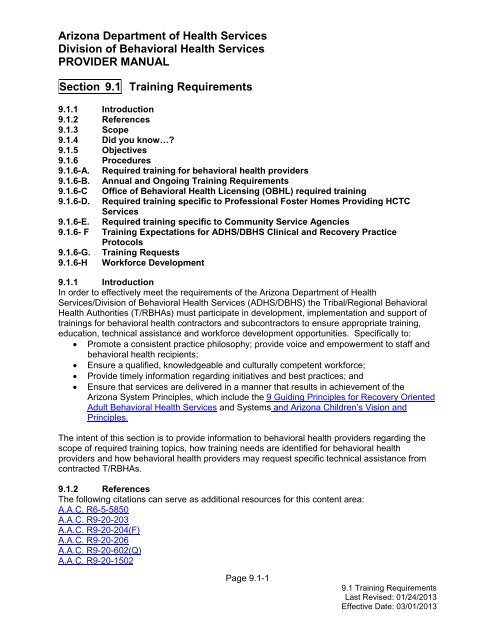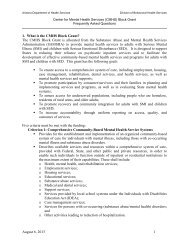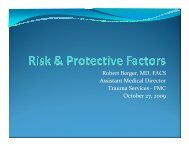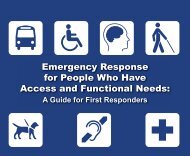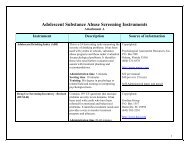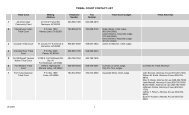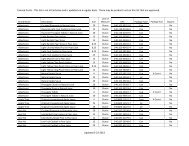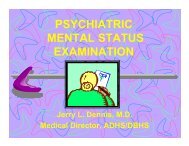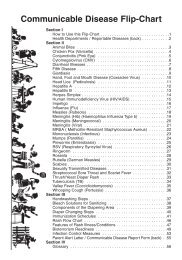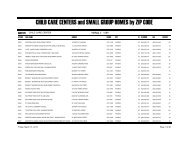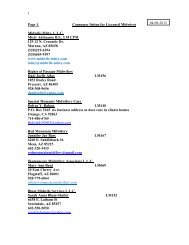Section 9.1 Training Requirements - Arizona Department of Health ...
Section 9.1 Training Requirements - Arizona Department of Health ...
Section 9.1 Training Requirements - Arizona Department of Health ...
You also want an ePaper? Increase the reach of your titles
YUMPU automatically turns print PDFs into web optimized ePapers that Google loves.
<strong>Arizona</strong> <strong>Department</strong> <strong>of</strong> <strong>Health</strong> Services<br />
Division <strong>of</strong> Behavioral <strong>Health</strong> Services<br />
PROVIDER MANUAL<br />
<strong>Section</strong> <strong>9.1</strong> <strong>Training</strong> <strong>Requirements</strong><br />
<strong>9.1</strong>.1 Introduction<br />
<strong>9.1</strong>.2 References<br />
<strong>9.1</strong>.3 Scope<br />
<strong>9.1</strong>.4 Did you know…?<br />
<strong>9.1</strong>.5 Objectives<br />
<strong>9.1</strong>.6 Procedures<br />
<strong>9.1</strong>.6-A. Required training for behavioral health providers<br />
<strong>9.1</strong>.6-B. Annual and Ongoing <strong>Training</strong> <strong>Requirements</strong><br />
<strong>9.1</strong>.6-C Office <strong>of</strong> Behavioral <strong>Health</strong> Licensing (OBHL) required training<br />
<strong>9.1</strong>.6-D. Required training specific to Pr<strong>of</strong>essional Foster Homes Providing HCTC<br />
Services<br />
<strong>9.1</strong>.6-E. Required training specific to Community Service Agencies<br />
<strong>9.1</strong>.6- F <strong>Training</strong> Expectations for ADHS/DBHS Clinical and Recovery Practice<br />
Protocols<br />
<strong>9.1</strong>.6-G. <strong>Training</strong> Requests<br />
<strong>9.1</strong>.6-H Workforce Development<br />
<strong>9.1</strong>.1 Introduction<br />
In order to effectively meet the requirements <strong>of</strong> the <strong>Arizona</strong> <strong>Department</strong> <strong>of</strong> <strong>Health</strong><br />
Services/Division <strong>of</strong> Behavioral <strong>Health</strong> Services (ADHS/DBHS) the Tribal/Regional Behavioral<br />
<strong>Health</strong> Authorities (T/RBHAs) must participate in development, implementation and support <strong>of</strong><br />
trainings for behavioral health contractors and subcontractors to ensure appropriate training,<br />
education, technical assistance and workforce development opportunities. Specifically to:<br />
Promote a consistent practice philosophy; provide voice and empowerment to staff and<br />
behavioral health recipients;<br />
Ensure a qualified, knowledgeable and culturally competent workforce;<br />
<br />
<br />
Provide timely information regarding initiatives and best practices; and<br />
Ensure that services are delivered in a manner that results in achievement <strong>of</strong> the<br />
<strong>Arizona</strong> System Principles, which include the 9 Guiding Principles for Recovery Oriented<br />
Adult Behavioral <strong>Health</strong> Services and Systems and <strong>Arizona</strong> Children’s Vision and<br />
Principles.<br />
The intent <strong>of</strong> this section is to provide information to behavioral health providers regarding the<br />
scope <strong>of</strong> required training topics, how training needs are identified for behavioral health<br />
providers and how behavioral health providers may request specific technical assistance from<br />
contracted T/RBHAs.<br />
<strong>9.1</strong>.2 References<br />
The following citations can serve as additional resources for this content area:<br />
A.A.C. R6-5-5850<br />
A.A.C. R9-20-203<br />
A.A.C. R9-20-204(F)<br />
A.A.C. R9-20-206<br />
A.A.C. R9-20-602(Q)<br />
A.A.C. R9-20-1502<br />
Page <strong>9.1</strong>-1<br />
<strong>9.1</strong> <strong>Training</strong> <strong>Requirements</strong><br />
Last Revised: 01/24/2013<br />
Effective Date: 03/01/2013
<strong>Arizona</strong> <strong>Department</strong> <strong>of</strong> <strong>Health</strong> Services<br />
Division <strong>of</strong> Behavioral <strong>Health</strong> Services<br />
PROVIDER MANUAL<br />
A.A.C. R9-21-101<br />
A.A.C. R9-21-301 through 314<br />
AHCCCS/ADHS Contract<br />
ADHS/RBHA Contracts<br />
ADHS/TRBHA IGAs<br />
<strong>Section</strong> 3.20, Credentialing and Recredentialing<br />
<strong>Section</strong> 3.23, Cultural Competence<br />
<strong>Section</strong> 4.3, Coordination <strong>of</strong> Care with AHCCCS <strong>Health</strong> Plans, Primary Care Providers and<br />
Medicare Providers<br />
<strong>Section</strong> 4.4, Coordination <strong>of</strong> Care with other Governmental Entities<br />
<strong>Section</strong> 5.4, Special Assistance for Persons Determined to Have a Serious Mental Illness<br />
<strong>Section</strong> 7.3, Seclusion and Restraint Reporting<br />
<strong>Section</strong> 8.4, Performance Improvement Projects<br />
<strong>Section</strong> 9.2, Peer Support/Recovery Support <strong>Training</strong>, Certification and Supervision<br />
<strong>Requirements</strong><br />
Policy and Procedure Manual CO 1.2, Cultural Competence<br />
Policy and Procedure Manual MI 5.2, Community Service Agencies-Title XIX Certification<br />
<strong>Arizona</strong> Vision and 12 Principles<br />
9 Guiding Principles for Recovery Oriented Adult Behavioral <strong>Health</strong> Services and Systems<br />
Principles for Persons Determined to have a Serious Mental Illness (SMI).<br />
ADHS/DBHS Office <strong>of</strong> Individual and Family Affairs Web Page<br />
<strong>9.1</strong>.3 Scope<br />
To whom does this apply?<br />
This section applies to all T/RBHAs and contracted behavioral health providers delivering<br />
covered services within the ADHS/DBHS public health and behavioral health systems.<br />
<strong>9.1</strong>.4 Did you know…?<br />
ADHS/DBHS monitors the T/RBHAs to ensure behavioral health providers receive all required<br />
training.<br />
ADHS/DBHS requires T/RBHAs to consult with providers regarding what training topics are<br />
necessary, how training curricula are developed and how training content is presented.<br />
Information concerning the qualifications required <strong>of</strong> T/RBHA and provider trainers is<br />
determined by each T/RBHA. [T/RBHA insert link here to qualifications or T/RBHA identify<br />
how providers can access trainer requirements].<br />
In addition to the required training content areas, T/RBHAs must ensure that appropriate<br />
training/technical assistance is available to behavioral health providers when deficiencies are<br />
identified.<br />
Providers involved in ordering, providing, monitoring or evaluating seclusion or restraint must<br />
complete and document education and training. Education and training must include the<br />
following: understanding behavioral and environmental risk factors, nonphysical interventions,<br />
the safe use <strong>of</strong> seclusion or restraint and responding to emergency situations (see PM 7.3,<br />
Seclusion and Restraint Reporting).<br />
Page <strong>9.1</strong>-2<br />
<strong>9.1</strong> <strong>Training</strong> <strong>Requirements</strong><br />
Last Revised: 01/24/2013<br />
Effective Date: 03/01/2013
<strong>Arizona</strong> <strong>Department</strong> <strong>of</strong> <strong>Health</strong> Services<br />
Division <strong>of</strong> Behavioral <strong>Health</strong> Services<br />
PROVIDER MANUAL<br />
Family members, peer-run, family-run, and parent-support organizations must be utilized to<br />
provide technical assistance, training, coaching and support to peers, family members and<br />
youth who assume leadership roles within the behavioral health system (i.e., roles or<br />
membership on Boards <strong>of</strong> Directors and advisory groups which develop and implement<br />
programs, policies, and quality management activities). For more information, see the<br />
ADHS/DBHS Office <strong>of</strong> Individual and Family Affairs webpage.<br />
<strong>9.1</strong>.5 Objectives<br />
To ensure T/RBHAs and their contracted providers have the necessary knowledge, education<br />
and skills to increase and successfully provide high quality services for all individuals accessing<br />
and receiving services in the public behavioral health system.<br />
<strong>9.1</strong>.6 Procedures<br />
Each T/RBHA must monitor and implement training activities and requirements outlined in<br />
<strong>Section</strong> <strong>9.1</strong>.6 A - H. In addition, T/RBHAs will annually evaluate the impact <strong>of</strong> the training<br />
requirements and activities in order to develop a qualified, knowledgeable and culturally<br />
competent workforce.<br />
<strong>9.1</strong>.6-A. Required training for behavioral health providers<br />
T/RBHAs and their providers must ensure the following within 90 days <strong>of</strong> the staff person’s hire<br />
date, as relevant to each staff person’s job duties and responsibilities and annually as<br />
applicable (see subsection <strong>9.1</strong>.6-D for training requirements applicable to Home Care <strong>Training</strong><br />
to Home Care Client (HCTC) providers and subsection <strong>9.1</strong>.6-E for training requirements<br />
applicable to Community Service Agencies):<br />
<strong>Section</strong> 1<br />
Fraud and program abuse recognition and reporting requirements and protocols;<br />
Managed care concepts, including information on the T/RBHA and the public behavioral<br />
health system;<br />
Screening for eligibility, enrollment for covered behavioral health services (when<br />
eligible), and referral when indicated;<br />
Overview <strong>of</strong> <strong>Arizona</strong> behavioral health system policies and procedures in the <strong>Arizona</strong><br />
Vision and 12 Principles in the children’s system,<br />
Overview <strong>of</strong> <strong>Arizona</strong>’s behavioral health system policies and procedures in the 9 Guiding<br />
Principles for Recovery Oriented Adult Behavioral <strong>Health</strong> Services and Systems in the<br />
adult system,<br />
Overview <strong>of</strong> partnership with <strong>Department</strong> <strong>of</strong> Economic Services/Rehabilitative Services<br />
Administration (DES/RSA);<br />
Cultural competency; including Cultural Competency 101: Embracing Diversity<br />
(ADHS/DBHS curriculum);<br />
Interpretation and translation services;<br />
ADHS/DBHS Demographic Data Set, including required timeframes for data submission<br />
and valid values; and<br />
Identification and reporting <strong>of</strong> quality <strong>of</strong> care concerns and the quality <strong>of</strong> care concerns<br />
investigation process.<br />
Page <strong>9.1</strong>-3<br />
<strong>9.1</strong> <strong>Training</strong> <strong>Requirements</strong><br />
Last Revised: 01/24/2013<br />
Effective Date: 03/01/2013
<strong>Arizona</strong> <strong>Department</strong> <strong>of</strong> <strong>Health</strong> Services<br />
Division <strong>of</strong> Behavioral <strong>Health</strong> Services<br />
PROVIDER MANUAL<br />
<strong>Section</strong> 2<br />
Use <strong>of</strong> assessment and other screening tools (e.g., substance-related, crisis/risk,<br />
developmental, Early and Periodic Screening, Diagnosis and Treatment (EPSDT)<br />
Program etc.), including the Birth-to-Five Assessment depending upon population(s)<br />
served;<br />
Use <strong>of</strong> effective interview and observational techniques that support engagement and<br />
are strengths-based, recovery-oriented, and culturally sensitive;<br />
Application <strong>of</strong> diagnostic classification systems and methods depending upon<br />
population(s) served;<br />
Best practices in the treatment and prevention <strong>of</strong> behavioral health disorders;<br />
Behavioral health service planning and implementation which includes family vision and<br />
voice, developed in collaborations with the individual/family needs as identified through<br />
initial and ongoing assessment practices;<br />
Covered behavioral health services (including information on how to assist persons in<br />
accessing all medically necessary covered behavioral health services regardless <strong>of</strong> a<br />
person’s behavioral health category assignment or involvement with any one type <strong>of</strong><br />
service provider);<br />
Overview <strong>of</strong> Substance Abuse Prevention and Treatment Block Grant (SAPT): priority<br />
placement criteria, interim service provision, consumer wait list reporting, and<br />
expenditure restrictions <strong>of</strong> the SAPT Block Grant in accordance with requirements in<br />
PM <strong>Section</strong> 3.19, Special Populations; PM 3.2 Appointment Standards and Timeliness <strong>of</strong><br />
Service and; 45 CFR Part 96;<br />
Behavioral health providers should receive training on the ADHS/DBHS National<br />
Practice Guidelines and Clinical Guidance Documents with required elements before<br />
providing services, but must receive training within six months <strong>of</strong> the staff person’s hire<br />
date. (Protocol training is only required if pertinent to populations served).<br />
Clinical training as it relates to specialty populations including but limited to conditions<br />
based on identified need;<br />
Information regarding the appropriate clinical approaches when delivering services to<br />
children in the care and custody <strong>of</strong> the <strong>Arizona</strong> <strong>Department</strong> <strong>of</strong> Economic<br />
Security/Division <strong>of</strong> Children Youth and Families (ADES/DCYF); and<br />
Understanding behavioral and environmental risk factors, nonphysical interventions, the<br />
safe use <strong>of</strong> seclusion or restraint and responding to emergency situations in accordance<br />
with PM 7.3, Seclusion and Restraint Reporting.<br />
<strong>Section</strong> 3<br />
Behavioral health record documentation requirements (see PM 4.2, Behavioral <strong>Health</strong><br />
Medical Record Standards);<br />
Confidentiality/<strong>Health</strong> Information Portability and Accountability Act (HIPAA);<br />
Sharing <strong>of</strong> treatment/medical information;<br />
Coordination <strong>of</strong> service delivery for persons with complex needs (e.g. persons at risk <strong>of</strong><br />
harm to self and others, court ordered to receive treatment);<br />
Rights and responsibilities <strong>of</strong> eligible and enrolled behavioral health recipients, including<br />
rights for persons determined to have Serious Mental Illness (SMI);<br />
Appeals, grievances and requests for investigations;<br />
Complaint process (see PM 5.2, Member Complaints);<br />
Customer service;<br />
Page <strong>9.1</strong>-4<br />
<strong>9.1</strong> <strong>Training</strong> <strong>Requirements</strong><br />
Last Revised: 01/24/2013<br />
Effective Date: 03/01/2013
<strong>Arizona</strong> <strong>Department</strong> <strong>of</strong> <strong>Health</strong> Services<br />
Division <strong>of</strong> Behavioral <strong>Health</strong> Services<br />
PROVIDER MANUAL<br />
Coordination <strong>of</strong> care requirements with Primary Care Providers (PCPs) (see PM 4.3,<br />
Coordination <strong>of</strong> Care with AHCCCS <strong>Health</strong> Plans, Primary Care Providers and Medicare<br />
Providers);<br />
Third party liability and coordination <strong>of</strong> benefits (see PM 3.5, Third Party Liability and<br />
Coordination <strong>of</strong> Benefits);<br />
Other involved agencies and government entities (see PM 4.4, Coordination <strong>of</strong> Care with<br />
other Governmental Entities);<br />
Claims/encounters submission process (see PM 6.2, Submitting Claims and Encounters<br />
to the RBHA);<br />
<br />
<br />
<br />
<br />
Advance Directives (see PM 3.12, Advance Directives);<br />
Identification and reporting <strong>of</strong> persons in need <strong>of</strong> Special Assistance for individuals who<br />
have been determined to have a Serious Mental Illness (SMI) and ensuring involvement<br />
<strong>of</strong> persons providing Special Assistance (see PM 5.4, Special Assistance for Persons<br />
Determined to Have a Serious Mental Illness);<br />
Providers delivering services through distinct programs (e.g., Assertive Community<br />
Treatment teams, Dialectical Behavioral Therapy, Multi-Systemic Therapy,<br />
developmental disabilities, trauma, substance abuse, children age birth to five, and Level<br />
I facilities );<br />
Behavioral health recipient benefit options trainings: such as Medicare Modernization<br />
Act (MMA) <strong>Department</strong> <strong>of</strong> Economic Security/Rehabilitation Services Administration<br />
(DES/RSA) Substance Abuse Prevention Treatment (SAPT) grant.<br />
Specific situations may necessitate the need for additional trainings. For example, quality<br />
improvement initiatives that may require focused training efforts and/or new regulations that<br />
impact the public behavioral health system (e.g., the Balanced Budget Act (BBA), Medicaid<br />
Modernization Act (MMA), the Affordable Care Act (ACA) and Deficit Reduction Act (DRA)).<br />
Additional trainings may be required, as determined by geographic service area identified<br />
needs.<br />
[T/RBHA insert additional training information here.]<br />
<strong>9.1</strong>.6-B. Annual and Ongoing <strong>Training</strong> <strong>Requirements</strong><br />
In addition to training required within the first 90 days <strong>of</strong> hire, all T/RBHA subcontracted<br />
providers are required to undergo and provide ongoing training for the following content areas:<br />
ADHS/DBHS Demographic Data Set, including required timeframes for data submission,<br />
valid values and as changes occur;<br />
Monthly trainings concerning procedures for submissions <strong>of</strong> encounters as determined<br />
by ADHS/DBHS;<br />
Annual cultural competency and linguistically appropriate training updates for staff at all<br />
levels and across all disciplines respective to underrepresented/underserved<br />
populations;<br />
Identification and reporting <strong>of</strong> Quality <strong>of</strong> Care Concerns and the Quality <strong>of</strong> Care<br />
Concerns investigations process;<br />
Inter-rater reliability;<br />
American Society <strong>of</strong> Addition Medicine Patient Placement Criteria (ASAM PPC-2R);<br />
Child and Adolescent Service Intensity Instrument (CASII);<br />
Ticket to Work/Disability Benefits 101;<br />
Page <strong>9.1</strong>-5<br />
<strong>9.1</strong> <strong>Training</strong> <strong>Requirements</strong><br />
Last Revised: 01/24/2013<br />
Effective Date: 03/01/2013
<strong>Arizona</strong> <strong>Department</strong> <strong>of</strong> <strong>Health</strong> Services<br />
Division <strong>of</strong> Behavioral <strong>Health</strong> Services<br />
PROVIDER MANUAL<br />
<br />
<br />
<br />
Peer, family member, peer-run, family-run and parent-support training and coaching,<br />
Identification and reporting <strong>of</strong> persons in need <strong>of</strong> Special Assistance for individuals who<br />
have been determined to have a Serious Mental Illness (SMI) and ensuring involvement<br />
<strong>of</strong> persons providing Special Assistance (see PM 5.4, Special Assistance for Persons<br />
Determined to Have a Serious Mental Illness) and;<br />
Workforce Development trainings specific to hiring, support, continuing education and<br />
pr<strong>of</strong>essional development.<br />
Specific situations may necessitate the need for additional trainings. For example, quality<br />
improvement initiatives that may require focused training efforts and/or new regulations that<br />
impact the public behavioral health system (e.g., the Balanced Budget Act (BBA), Medicaid<br />
Modernization Act (MMA), the Affordable Care Act (ACA) and Deficit Reduction Act (DRA)).<br />
Additional trainings may be required, as determined by geographic service area identified<br />
needs.<br />
[T/RBHA insert information here identifying T/RBHA specific ongoing training<br />
requirements.]<br />
<strong>9.1</strong>.6-C Office <strong>of</strong> Behavioral <strong>Health</strong> Licensing (OBHL) required training<br />
<strong>Training</strong> must be completed and documented in accordance with OBHL requirements (see R9-<br />
20-204(F) and R9-20-206 and http://www.azdhs.gov/als/behavior/training.htm ).<br />
<strong>9.1</strong>.6-D. Required training specific to Pr<strong>of</strong>essional Foster Homes Providing HCTC<br />
Services<br />
Children<br />
Medicaid reimbursable Home Care <strong>Training</strong> to Home Care Client (HCTC) services for children<br />
are provided in pr<strong>of</strong>essional foster homes licensed by the <strong>Arizona</strong> <strong>Department</strong> <strong>of</strong> Economic<br />
Security/Office <strong>of</strong> Licensing, Certification and Regulation which must comply with training<br />
requirements as listed in R6-5-5850. All agencies that recruit and license pr<strong>of</strong>essional foster<br />
home providers must provide and credibly document the following training to each contracted<br />
provider:<br />
CPR and First Aid <strong>Training</strong>;<br />
18 hours <strong>of</strong> pre-service training utilizing the <strong>Arizona</strong> Home Care <strong>Training</strong> to Client<br />
Service Curriculum;<br />
The provider delivering HCTC services must complete the above training prior to delivering<br />
services. In addition, the provider delivering HCTC services for children must complete and<br />
credibly document annual training as outlined in R6-5-5850, Special Provisions for a<br />
Pr<strong>of</strong>essional Foster Home.<br />
Adults<br />
Medicaid reimbursable HCTC services for adults are provided in Adult Therapeutic Foster<br />
Homes licensed by ADHS/OBHL, and must comply with training requirements as listed in<br />
R9-20-1502:<br />
<br />
<br />
Protecting the person’s rights;<br />
Providing behavioral health services that the adult therapeutic foster home is authorized<br />
to provide and the provider delivering HCTC services is qualified to provide;<br />
Page <strong>9.1</strong>-6<br />
<strong>9.1</strong> <strong>Training</strong> <strong>Requirements</strong><br />
Last Revised: 01/24/2013<br />
Effective Date: 03/01/2013
<strong>Arizona</strong> <strong>Department</strong> <strong>of</strong> <strong>Health</strong> Services<br />
Division <strong>of</strong> Behavioral <strong>Health</strong> Services<br />
PROVIDER MANUAL<br />
<br />
<br />
<br />
<br />
<br />
Protecting and maintaining the confidentiality <strong>of</strong> clinical records;<br />
Recognizing and respecting cultural differences;<br />
Recognizing, preventing or responding to a situation in which a person:<br />
o May be a danger to self or a danger to others;<br />
o Behaves in an aggressive or destructive manner;<br />
o May be experiencing a crisis situation; or<br />
o May be experiencing a medical emergency;<br />
Reading and implementing a person’s treatment plan; and<br />
Recognizing and responding to a fire, disaster, hazard or medical emergency<br />
In addition, providers delivering HCTC services to adults must complete and credibly document<br />
annual training as required by R9-20-1502.<br />
<strong>9.1</strong>.6-E. Required training specific to Community Service Agencies<br />
Community Service Agencies (CSAs) must submit documentation as part <strong>of</strong> the initial and<br />
annual CSA application indicating that all direct service staff and volunteers have completed<br />
training specific to CSAs prior to providing services to behavioral health recipients. For a<br />
complete description <strong>of</strong> all required training specific to CSAs, see Policy and Procedure Manual<br />
MI 5.2, Community Service Agencies-Title XIX Certification.<br />
<strong>9.1</strong>.6- F <strong>Training</strong> Expectations for ADHS/DBHS Clinical and Recovery Practice<br />
Protocols<br />
Under the direction <strong>of</strong> the ADHS/DBHS Chief Medical Officer, the <strong>Department</strong> publishes<br />
national practice guidelines and clinical guidance documents to assist behavioral health<br />
providers. These documents, some with required elements can be accessed at<br />
http://azdhs.gov/bhs/guidance/index.htm<br />
Behavioral health providers providing services to children and families involved with Child<br />
Protective Services (CPS) will be required to attend “Unique Needs <strong>of</strong> Children Involved with<br />
CPS” training that is <strong>of</strong>fered by each T/RBHA on a regular basis. (See ADHS/DBHS Practice<br />
Protocol, Unique Needs <strong>of</strong> Children, Youth and Families Involved with Child Protective<br />
Services).<br />
<strong>Training</strong> on Child and Family Team (CFT) practice, depending on the population(s) served; (See<br />
ADHS/DBHS Practice Protocol Child and Family Team Practice) <strong>Training</strong> curriculums can be<br />
differentiated based on the role (BHMP, BHT, Coaches, Family Support Partners, Supervisors,<br />
etc.) <strong>of</strong> training participation provided in CFT Practice. Curriculums and certification processes<br />
shall be approved by T/RBHAs and ADHS/DBHS.<br />
<strong>9.1</strong>.6-G. <strong>Training</strong> Requests<br />
For additional training requests and/or technical assistance specific to the trainings listed above<br />
and /or identified area <strong>of</strong> need, contact the T/RBHA.<br />
[T/RBHA identify how providers can access these types <strong>of</strong> trainings and specific contact<br />
information.]<br />
Page <strong>9.1</strong>-7<br />
<strong>9.1</strong> <strong>Training</strong> <strong>Requirements</strong><br />
Last Revised: 01/24/2013<br />
Effective Date: 03/01/2013
<strong>Arizona</strong> <strong>Department</strong> <strong>of</strong> <strong>Health</strong> Services<br />
Division <strong>of</strong> Behavioral <strong>Health</strong> Services<br />
PROVIDER MANUAL<br />
<strong>9.1</strong>.6-H Workforce Development<br />
<strong>Training</strong> Expert:<br />
T/RBHAs must employ a training expert/contact as key personnel and point <strong>of</strong> contact to<br />
implement and oversee compliance with the training requirements, training plan, PM <strong>9.1</strong>,<br />
<strong>Training</strong> <strong>Requirements</strong> and participate in the <strong>Training</strong> Coordinators committees.<br />
<strong>Training</strong> Development Plan:<br />
Each T/RBHA must develop, implement and submit an Annual <strong>Training</strong> Plan that provides<br />
information and documentation <strong>of</strong> all trainings. The training plan and training curriculums will be<br />
submitted annually, forty-five days after fiscal year end.<br />
<strong>Training</strong> Quarterly Updates:<br />
Each T/RBHA must submit a Workforce Development Quarterly Update which includes<br />
information specific to initiatives and activities specific to training. Quarterly updates are to be<br />
submitted 30 days after quarter end.<br />
ADHS/DBHS Ownership <strong>of</strong> any intellectual property:<br />
This policy will serve as disclosure <strong>of</strong> ownership <strong>of</strong> any intellectual property created or disclosed<br />
during the course <strong>of</strong> the service contract such as educational materials created for classroom<br />
training and/or learning programs.<br />
Exceptions:<br />
Those cases in which the production <strong>of</strong> such materials is part <strong>of</strong> sponsored programs;<br />
those cases in which substantial University resources were used in creating educational<br />
materials; and<br />
those cases which are specifically commissioned by contacted vendors or done as part<br />
<strong>of</strong> an explicitly designated assignment other than normal contactor educational pursuits.<br />
[T/RBHA insert T/ RBHA information here specific to workforce development<br />
requirements.]<br />
Page <strong>9.1</strong>-8<br />
<strong>9.1</strong> <strong>Training</strong> <strong>Requirements</strong><br />
Last Revised: 01/24/2013<br />
Effective Date: 03/01/2013


